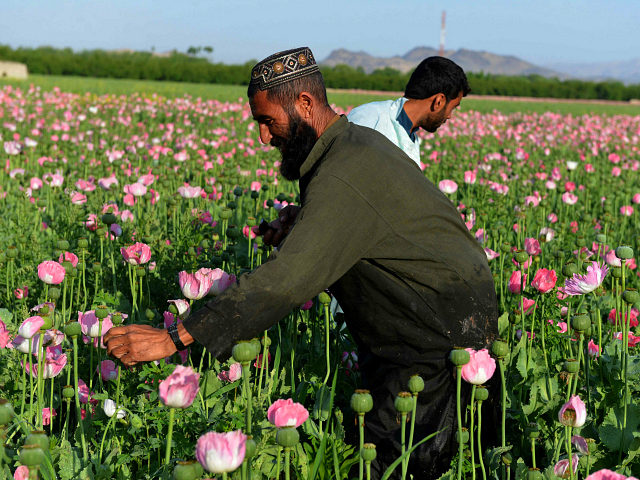WASHINGTON D.C. — The United States had the ability to use aerial spraying to destroy the opium crops in Afghanistan used by the Taliban to fund their terrorist activities after 9/11 but refused to do so out of concern that the plants “might be too close to a mosque,” declared Rep. Dana Rohrabacher (R-CA) during a congressional hearing.
Rep. Rohrabacher said that U.S. government has been able to aerial spray and eradicate the opium crops in Afghanistan used to make the deadly heroin drug for at least 20 years but has declined to employ that capability.
During an April 27 hearing on Afghanistan held by the House Foreign Affairs Subcommittee on Terrorism, the Republican congressman said in reference to the lucrative opium business:
Let me note for the record, Mr. Chairman, we have had that [spraying] capability for at least 20 years and have not touch it, have not done it. We didn’t do it after 9/11. We had that capability, and we didn’t do it. After 9/11 there were store houses of opium where the Taliban had stored billions of dollars of opium and heroin in special locations in Afghanistan. And I will just go on the record for the first time on this — I notified our government at the very highest level exactly where those were, and they needed to be bombed because the Taliban needed to be denied that money and our government never did that. Our government never did it. They always, The excuse was always “Oh we think they might be too close to a mosque.”
Despite the estimated $8.5 billion in American taxpayer funds that the United States has already invested on anti-narcotics measures in Afghanistan since the war started in October 2001, the country remains the world’s top producer of opium and its heroin derivative.
According to the U.S. military, the Taliban, considered the strongest terrorist group in Afghanistan, generates as much as 60 percent of its funding from the illicit opium trade.
Currently, the Taliban controls more territory than during any time since the group was removed from power by the U.S. military in late 2001.
Rep. Rohrabacher noted:
So the Taliban gets a fair amount of money [from the opium trade] and of course, the Afghan government who we put into place — corrupt officials in that group including the family of [former Afghan president] Mr. [Hamid] Karzai, maybe. We’re talking about billions of dollars of wealth. Well, with billions of dollars going like that, coming out like that, I can imagine that would buy a lot of AK-47 bullets, and people wonder where people get the money.
Are any of you aware that we now have the ability to spray an area and within a short period of time, in a way that will not hurt other crops, that would eliminate the poppy production in Afghanistan and basically would not be permitted to grow in that area again for 10 years?
Using the latest United Nations data available, Breitbart News has determined that estimated opium production and the cultivation area in Afghanistan have skyrocketed more than 25-fold over the course of the ongoing war in the country, to 4,800 metric tons and 201,000 hectares (ha), respectively.
In 2016, the latest year for which data is available, the Afghan territory under cultivation was equivalent to an area more than 11 times the size of Washington, D.C.
Some experts, like Ioannis Koskinas from the New America think-tank, suggest the Islamic State (ISIS/ISIL) branch in Afghanistan may be involved in the opium trade.
Nevertheless, Dr. Vanda Felbab-Brown from the Brookings Institution wrote in her written testimony prepared for the House panel hearing, “The Taliban has also sponsored opium poppy cultivation in Afghanistan and the jobs and income it provides for ordinary Afghans, thus generating political capital.”
“IS [Islamic State] in Afghanistan, on the other hand, has prohibited opium poppy cultivation both on grounds of ideological purity the strategic goal of ensuring that the only employment available to local men is as IS foot soldiers,” she also wrote
Asked by Rep. Rohrabacher if Islamic extremist groups in Afghanistan were using opium to fund their activities, Dr. Felbab-Brown responded that other than the Taliban, “There is no evidence that the money has been going to other terrorist groups.”
However, Dr. Seth Jones of the RAND Corporation who also testified interrupted her, saying, “But the Taliban, which does have relations with other groups, the Taliban does get a fair amount of money.”
The U.S. military has said the Afghanistan-Pakistan region is home to the largest concentration of jihadist groups in the world.

COMMENTS
Please let us know if you're having issues with commenting.